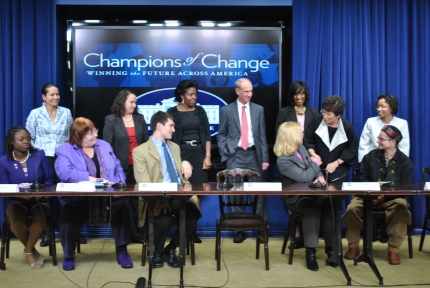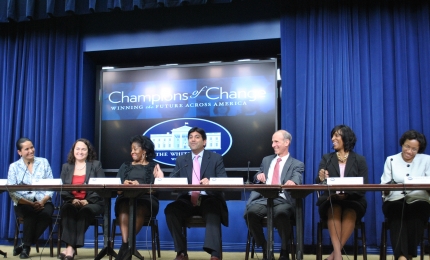Council on Women and Girls Blog
Council on Women and Girls Weekly Highlights: "Welcome Home"
Posted by on December 16, 2011 at 3:15 PM EDTWelcome to the Council on Women and Girls Weekly Highlights. If you have friends or family who would like to support the efforts of the Council on Women and Girls, please visit our website and share this link with others on Facebook and Twitter.
Yesterday, President Obama and the First Lady went to Fort Bragg to deliver remarks to troops and military families. As we definitively end America’s war in Iraq this month, the President wanted to speak directly with the troops at Ft. Bragg and to members of the Armed Forces and their families everywhere. The President knows the enormous sacrifices and achievements of the brave Americans who served in the Iraq War, and he spoke about the extraordinary milestone of bringing the war in Iraq to an end.
Today, as part of a series of Executive Actions, President Obama and the U.S. Secretary of Labor, Hilda L. Solis, announced new, proposed rules that would provide minimum wage and overtime protections for nearly two million workers who provide in-home health care services for the elderly and infirm. As Secretary Solis notes in her blog, “The vast majority of these workers are women, many of whom serve as the primary breadwinner for their families.”
Please be sure to check out the highlights below for some upcoming engagement opportunities.
Best wishes for a great week!
Photo of the Week
Dr. Biden’s Children’s Holiday Party Focuses on Support for Military Families
Stay Engaged
Women-owned businesses are one of the fastest growing segments of the small business community, but women continue to face challenges, including access to capital and lack of opportunities to grow.
Learn more about WomenThe Impact on Women of Failing to Extend Unemployment Insurance
Posted by on December 16, 2011 at 2:45 PM EDTEd. note: This is cross-posted from Work in Progress, the Official Blog of the Department of LaborIn the midst of this year’s holiday season, it is important to remember the millions of families that continue to struggle in the current economic climate. We have made steady progress over the last two years in getting people back to work after the worst economic crisis since the Great Depression. The number of people laid off and going into unemployment has come down to their 2008 levels and job openings are on the rise. Yet, we still have more work to do. There are millions of families who continue to struggle to make ends meet.
With 4 job seekers for every job opening, we know that it is still difficult for unemployed workers to find jobs no matter how hard they look. As these hard working Americans diligently fill out job applications, write and update resumes and cover letters and sit for interviews, we need to continue to help them to put food on the table for their families and keep a roof over their heads.
Over the next week, Congress will need to take action to extend the federal unemployment insurance (UI) benefits program, which has served as a lifeline for the millions of long-term unemployed and their families who need this assistance to get back on their feet.
This program helps the unemployed but also the entire American economy. Last year alone, the UI program helped 3.2 million people stay out of poverty, according to the Census Bureau. And independent analysts have stated, for every dollar spent on UI, the economy generates about 2 dollars in economic activity – meaning that an unemployed worker, who spends his UI benefits on food at a grocery store, helps the workers and suppliers of that grocery store stay employed. The UI money makes its way to gas station attendants, retailers and many other small businesses. As a result, in 2010, the program provided a vital boost to the economy and helped to keep an estimated 800,000 more people employed and to raise GDP by close to 1%.
Learn more about WomenProviding Protections for In-Home Care Workers
Posted by on December 15, 2011 at 2:10 PM EDTEd. note: This is cross-posted from Work in Progress, the Official Blog of the Department of LaborIn-home care service is a high growth industry, and it’s projected to grow by 50 percent between 2008 and 2018. In-home caregivers are an essential component of the health care system and will only become more important, as an increased number of patients turn to them for more affordable assistance with medical care as well as everyday tasks and household chores.
Many homecare providers earn less than the minimum wage and no overtime for these vital services. In 2007, then-Senator Obama spent a day with professional homecare worker Pauline Beck, assisting with her daily tasks and observing firsthand the unique challenges of in-home care (watch the video). He was impressed by Pauline’s dedication, and determined to assist her and others in her profession.
Today, Pauline joined me and President Obama as he announced a proposal from the U.S. Department of Labor to revise the Fair Labor Standards Act rules that would ensure fair pay for approximately 1.8 million workers who provide in-home care services for the elderly and infirm. This new rule would ensure that these hardworking professionals who provide valuable services to American families would receive the protections of minimum wage and overtime pay that nearly every employee in the United States already receives under the FLSA.
Many of these workers are the primary breadwinners for their families. Of the roughly 2 million workers who will be affected by this rule, more than 92 percent are women, nearly 50 percent are minorities, and nearly 40 percent rely on public benefits such as Medicaid and food stamps. According to the Bureau of Labor Statistics, home health care aides earn about $21,000 a year and many lack health insurance. That is unacceptable.
The proposed regulation would also ensure that employers who have been treating these workers fairly are no longer at a competitive disadvantage. Leveling the playing field for both workers and employers is a fundamental principle of the FLSA.
My department is committed to fighting for good jobs for everyone, jobs that enable workers to earn a living wage, afford health insurance and save for retirement. The services provided by in-home health care providers aren’t just professional; they’re personal. And for millions of American families, they’re indispensible. That’s why it’s so important to ensure that they receive the same job protections available to the majority of working Americans
Once published, we encourage you to provide comments on this important proposal by visiting the federal rulemaking website at www.regulations.gov. More information, including the proposed rule and fact sheet, is available at www.dol.gov/whd/flsa/companionNPRM.htm.
Hilda Solis is Secretary of the Department of LaborLearn more about WomenOpen for Questions: Women’s Entrepreneurship
Posted by on December 14, 2011 at 2:14 PM EDTAs President Obama has said, “our Nation's doers, makers, and entrepreneurs have proven time and again that, in America, it takes only a single good idea and the courage to pursue it to change history.”
Women-owned businesses are one of the fastest growing segments of the small business community, but women continue to face challenges, including access to capital and lack of opportunities to grow.
Ask questions and learn more about the federal government’s policies and programs that are designed to help women entrepreneurs at our upcoming “Open for Questions,” session with Christine Koronides of the National Economic Council, and the U.S. Small Business Administration’s Associate Administrator for Small Business, Ana Harvey.
- What: Open for Questions: Women’s Entrepreneurship
- Who: Christine Koronides, White House National Economic Council, and SBA’s Associate Administrator for Women’s Business Ownership, Ana Harvey
- When: Tuesday, December 20, at 3 p.m. EST
- Where: Watch live at WhiteHouse.gov/live and submit your questions via Facebook, Twitter using the hashtag #WHChat or our webform.
Hallie Schneir is Associate Director of the Office of Public Engagement
Championing Change for Women in Science
Posted by on December 12, 2011 at 12:45 PM EDTGraduating Howard University senior Bianca Bailey is an impressive international engineering role model. As a chemical engineering major at Howard and President of Engineers without Borders, which supports sustainable infrastructure development around the world, Bianca has traveled to Kenya, Brazil, and Haiti to volunteer on numerous engineering projects. But her path to renown wasn’t easy.
After losing her mother at a very early age, Bianca was raised by a single father and had to take on maternal responsibilities for her two younger siblings under difficult circumstances in urban Dallas. With the support of a non-profit organization, Girls, Inc., which encouraged her early interest in the sciences, Bianca pursued her love of engineering. And today, along with her many professional responsibilities, she is dedicated to inspiring other girls to do the same.
On Friday, December 9, 2011, the White House Office of Public Engagement in collaboration with OSTP welcomed to the White House Bianca and 11 other Champions of Change who have worked to increase the participation of women and girls in science, technology, engineering, and math fields.
The following individuals were recognized as outstanding community heroes who are helping to build the ranks of women in the Nation’s science, technology, engineering, and mathematics (STEM) workforce and ensure that America’s science and engineering enterprise is fueled by the diverse talents of all of its citizens:
- Bianca Bailey - Howard University engineering major and President, Engineers without Borders
- Barbara Bitters - Assistant Director for the Career and Technical Education Team at the Wisconsin Department of Public Instruction
- Tamara Brown - Project Controls Engineer, Praxair, Inc.
- Angela Byars-Winston - Associate Professor, University of Wisconsin Department of Medicine
- Judit Camacho - Executive Director, SACNAS (the Society for Advancement of Hispanics/Chicanos and Native Americans in Science)
- Elizabeth “Liesl” Chatman - Director of Teacher Professional Development, Science Museum of Minnesota
- Baker Franke - Teacher, University of Chicago Laboratory Schools
- Jennifer Harper Ogle - Associate Professor in Civil Engineering, Clemson University
- Elisabeth “Betty” Hayes - Professor of English, Arizona State University
- Bobby Shnabel - Dean of the School of Informatics, Indiana University, Bloomington
- Karen Thole - Professor of Mechanical Engineering , Head of the Department of Mechanical and Nuclear Engineering, Pennsylvania State University
- Avis Yates Rivers - President and CEO, Technologies Concept Group
Exemplifying the President’s and First Lady’s vision for an “all-hands-on-deck” approach for broadening participation in the sciences, these individuals brought their diverse experience as educators, students, non-profit directors, corporate executives, and public sector employees from 11 states to bear in a moderated conversation around best practices for removing the roadblocks that too often discourage girls from pursuing STEM subjects or compel women to drop out of STEM fields.
You can join similar conversations live at www.whitehouse.gov/live or at Twitter, hashtag #championsofchangewh.
Mary Maxon is OSTP’s Assistant Director for Biological Research
Learn more about Technology, WomenA Focus on Women and AIDS: Nationally and Abroad
Posted by on December 7, 2011 at 2:11 PM EDT“When black women feel forgotten, even though they account for most of the new cases among women, then we’ve got to do more." --President Obama, December 1, 2011
December 1 marked World AIDS Day, a time to remember those that have been affected by the HIV/AIDS epidemic over the past 30 years. Today, we must also continue to recognize and push forth the efforts to aid individuals affected across the globe. In recent years, we have seen success in programs such as the President’s Emergency Plan for AIDS Relief, but we must remember the toll this disease takes on our women, and ultimately our communities. Although rates of HIV/AIDS have been decreasing across many countries, there are many factors that have kept women and girls at risk. Globally, many prevention efforts and treatments still need to be successfully implemented in order to change uneven progress in the health of the world’s women and girls. With the world facing many battles, young women in many parts of the world are still becoming infected with HIV/AIDS. As of today, HIV is the leading cause of death and disease among women aged 15 to 49 years worldwide. Domestically, rates in many communities continue to effect women disproportionately, in better words: we’ve got to do more. President Obama and his Administration are committed to solving the AIDS crisis; an epidemic that has put women, and their families, at great risk.
During his speech at an event called “The Beginning of the End of AIDS,” at George Washington University, marking World AIDS Day, the President announced that the Administration is directing $50 million in increased funding for domestic HIV/AIDS treatment and care. The data shows a clear need for this increase in funding. According to 2009 HIV surveillance data by the Centers for Disease Control, women represented 24% of all diagnoses of HIV infection among United States (US) adults and adolescents in 40 states. Black and Latina women are disproportionately affected at all stages of HIV infection compared with women of other races/ethnicities. At some point in her lifetime, 1 in 139 women will be diagnosed with HIV infection; with Black and Hispanic/Latina women at higher risk than women of other races/ethnicity.
Over the past several years, the global HIV/AIDS epidemic has been met with increasing efforts across the international community and shown great potential. As stated by the Office of Women’s Health, numerous initiatives to promote prevention and treatment efforts have been implemented by governments and organizations worldwide. They have also noted that, in 33 countries, HIV incidence has dropped by more than 25 percent over the past decade; 22 of those countries are in sub-Saharan Africa. Even with these improvements, we must remember that challenges still remain.
Learn more about Women
- &lsaquo previous
- …
- 4
- 5
- 6
- 7
- 8
- 9
- 10
- 11
- 12
- …
- next &rsaquo
White House Blogs
- The White House Blog
- Middle Class Task Force
- Council of Economic Advisers
- Council on Environmental Quality
- Council on Women and Girls
- Office of Intergovernmental Affairs
- Office of Management and Budget
- Office of Public Engagement
- Office of Science & Tech Policy
- Office of Urban Affairs
- Open Government
- Faith and Neighborhood Partnerships
- Social Innovation and Civic Participation
- US Trade Representative
- Office National Drug Control Policy
categories
- Blueprint for an America Built to Last
- Equal Pay
- White House Internships
- Civil Rights
- Defense
- Disabilities
- Economy
- Education
- Energy and Environment
- Ethics
- Family
- Fiscal Responsibility
- Foreign Policy
- Health Care
- Homeland Security
- Immigration
- Inside the White House
- Poverty
- Rural
- Seniors and Social Security
- Service
- Taxes
- Technology
- Urban Policy
- Veterans
- Women
- Additional Issues












